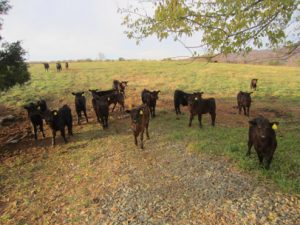
Fall calves from the 2013 season on Mr. Harrison’s farm in Troy, Va.
On October 6, Morgan and I had the privilege of interviewing Mr. Rob Harrison, a beef producer from Fluvanna County. Mr. Harrison’s farm is organized as part of Foods for Thought, Inc., a Virginia supplier of Roseda beef. Mr. Harrison’s products are all natural, dry aged, and use only therapeutic antibiotics.
Morgan and I caught up with Mr. Harrison as he made deliveries to restaurants in the Blacksburg area, a weekly occurrence that he handles himself. He makes deliveries towing a refrigerated trailer behind his SUV, which can make navigating the city streets a bit of a challenge at times. Although the site of the delivery, Blacksburg Tap House, has a parking lot too small for Mr. Harrison, that didn’t even slow him down. He pulled into the center lane in front of the restaurant, threw his hazards on, and got to work with a practiced efficiency that blew us away. He unloaded the trailer, deposited the product in the restaurant’s walk-in freezer, went inside for the check, and was back on the road within three minutes. After his deliveries were through, we followed him back to his house to hear his story.
Mr Harrison’s work marketing beef directly is the product of his backgrounds in agriculture and marketing. He was introduced to marketing while working for his father at his promotional products company. Agribusiness was already a part of Mr. Harrison’s life, as he had worked on a dairy farm before going to work for his father. He attended college at Virginia Tech, and graduated with a degree in Dairy Science in 1980. He spent most of his career working in sales full time while building up his beef operation, and moved to farming full time two years ago.
However, Mr. Harrison doesn’t technically consider himself a full-time farmer; he spends at least as much time as a salesman and distributor. Part of marketing directly to restaurants successfully isn’t just being capable in each of these areas, but also being able to balance them properly. During our time with Mr. Harrison, he returned often to the theme of efficiency and by that he meant that producers in the direct market are forced to be frugal and precise when allocating their time and resources. A busy day on the farm means a day not spent making connections with potential customers. Delivery days are also a potential drain on time and resources, which means that for Mr. Harrison, it is important to keep his clients grouped in markets that are close enough together for him to make multiple deliveries in a single day.
Mr Harrison also touched on the issue of agricultural advocacy, information, and misinformation. Mr. Harrison’s natural production and processing methods are not just important to him personally, they’re the foundation of his marketing strategy. However, he has found a lot of confusion among his customers around buzzwords like “all-natural,” and “organic,” concepts that are familiar to a farmer. Mr. Harrison might tell a potential customer that his beef is “natural,” defining the concept on his terms, and yet hear the customer refer to it as “organic” or “non-GMO” later in the same conversation, not knowing that these concepts are different from each other. On the one hand, moments like these serve as opportunities to educate customers about different production methods used in agriculture and drive home the farm’s core values. On the other hand, it’s important to ensure that customers don’t get confused about the actual nature of the product so that the farm’s brand remains intact.
Those of us on the Market Ready team would like to thank Mr. Harrison for his hospitality, his advice, and his willingness to give us a behind-the-scenes look at the marketing side of his operation.
Ben Garber
gben3@vt.edu
Blacksburg, Va
October 11, 2016
